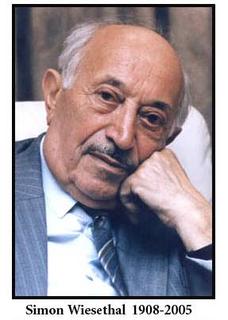
The death today of Simon Wiesenthal, at age 96, reminds me of the blog I wrote, Auschwitz, back on May 11th of this year. That post center on the final chapter of the series Auschwitz: Inside the Nazi State on PBS. Although to my knowledge, Wiesenthal was never a prisoner at Auschwitz, he was incarcerated at the Ostbahn camp, and after his escape and recapture, at Janwska.
Where my essay on Auschwitz centered on the terrible events that took place at that hellish death camp, the work of Simon Wiesenthal has continued—and continues—well into the present. Following his liberation from his Nazi capturers in 1945, Wiesenthal began seeking data on Nazi slaughter for the War Crimes Section of the United States Army. He later worked for the Army's Office of Strategic Services and Counter-Intelligence Corps; then he directed a relief and welfare organization, the Jewish Central Committee of the United States Zone of Austria. In 1947, he created the Jewish Historical Documentation Center in Linz, Austria, for the purpose of gathering evidence for war crime trials.
He continued his work to locate Nazis following the war and was instrumental in tracking down Adolf Eichmann in Argentina. Eichmann was seized in Argentina by Israeli agents and taken to Israel, where he tried and was found guilty of mass murder and executed on May 31, 1961. With his successful location of Eichmann, Wiesenthal reopened the Jewish Documentation Center in Vienna, and focused on the hunting of war criminals. During the following years, he was responsible for bringing over 1,100 war criminals to justice. Wiesenthal's book of memoirs, The Murderers Among Us
When someone asked why he chose to pursue the purveyors of evil and bring them to justice, Wiesenthal responded, "You believe in God and life after death. I also believe. When we come to the other world and meet the millions of Jews who died in the camps and they ask us, 'What have you done?', there will be many answers. You will say, 'I became a jeweler.' Another will say, I have smuggled coffee and American cigarettes.' Another will say, 'I built houses.' But I will say, 'I didn't forget you'."
To me, the greatest contribution that Simon Wiesenthal leaves the world is the continuing work of the Simon Wiesenthal Center, through which the horror of the Holocaust will hopefully never be forgotten and, therefore, never happen again.
Follow this link for more on Simon Wiesenthal

I agree with you fully, Thomas
ReplyDeleteEven before I was aware of my own Jewish ancestry—and the probable murders of my German relatives—I was involved in reading about and trying to understand the Holocaust. I don’t think that I can ever comprehend the mindset of those who created it. I can empathize with the victims and the survivors, but can never fully perceive the dehumanization and evil they endured.
One of my favorite psychiatrists and authors was the Holocaust survivor, Viktor Frankl. His book, “Man’s Search for Meaning” has influenced my life since I first read it. He wrote:
“Everything can be taken from a man but one thing; the last of the human freedoms—to choose one's attitude in any given set of circumstances, to choose one's own way"
And
“Ultimately, man should not ask what the meaning of his life is, but rather must recognize that it is he who is asked. In a word, each man is questioned by life; and he can only answer to life by answering for his own life; to life he can only respond by being responsible.”